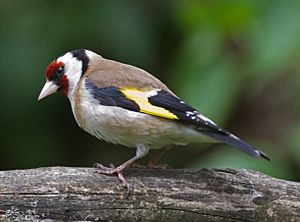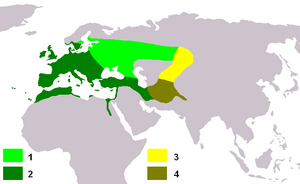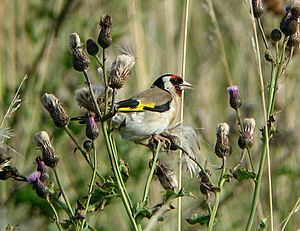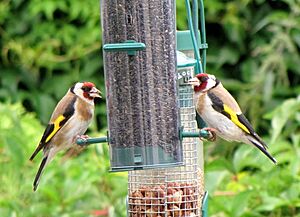Goldfinch facts for kids
Quick facts for kids Goldfinch |
|
|---|---|
 |
|
| In Birmingham, England | |
| Conservation status | |
| Scientific classification | |
| Kingdom: | |
| Phylum: | |
| Class: | |
| Order: | |
| Family: | |
| Genus: |
Carduelis
|
 |
|
| Carduelis carduelis carduelis 1 summer 2 all year Carduelis carduelis caniceps 3 summer 4 all year |
|

The Goldfinch is a beautiful small bird. It belongs to the finch family, known as Fringillidae. These birds are also called Carduelis in their scientific genus. Goldfinches are a type of passerine bird. This means they are perching birds. They are well-known for their bright colors and lovely song.
Contents
About the Goldfinch
Goldfinches are small and active birds. They have a striking appearance. Their faces are bright red. Their bodies are mostly brown and white. They also have bold black and yellow markings on their wings. These colors make them easy to spot.
Where Goldfinches Live
Goldfinches live in many parts of the world. You can find them across Europe and North Africa. They also live in western and central Asia. These birds prefer open areas. They like places with some trees and lowlands.
Many goldfinches stay in warmer areas all year. But some move to different places. They migrate from colder regions when winter comes. They might also move locally to find better weather. Goldfinches have also been brought to many new areas.
What Goldfinches Eat
Goldfinches love to eat small seeds. Their favorite foods come from thistles and teasels. You might see them picking seeds from these plants. When they have young, they also eat insects. This helps their babies grow strong. In winter, goldfinches often visit bird feeders. They enjoy the seeds people put out.
Goldfinch Families
Goldfinches build their nests carefully. They choose the outer twigs of tall, leafy trees. Sometimes, they even nest in bamboo. A female goldfinch lays four to six eggs. These eggs hatch in about 11 to 14 days.
Goldfinch Behavior
In the winter, goldfinches gather together. They form groups called flocks. These flocks can have up to forty birds. Sometimes, even more birds join a flock. This helps them find food and stay safe. Their song is a pleasant, silvery sound. It is often described as a twittering melody.
See also
 In Spanish: Jilguero (desambiguación) para niños
In Spanish: Jilguero (desambiguación) para niños
 | Aaron Henry |
 | T. R. M. Howard |
 | Jesse Jackson |



